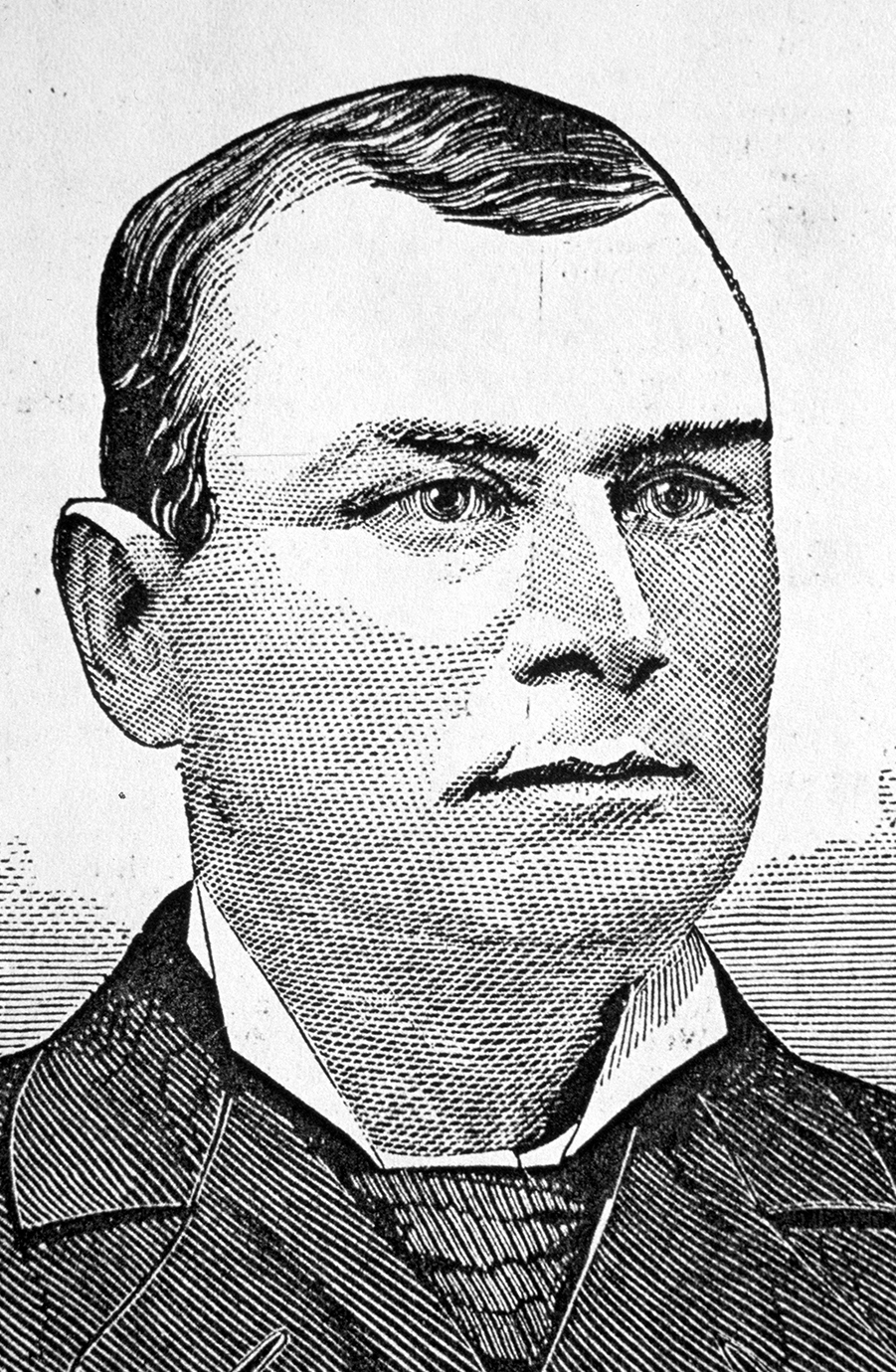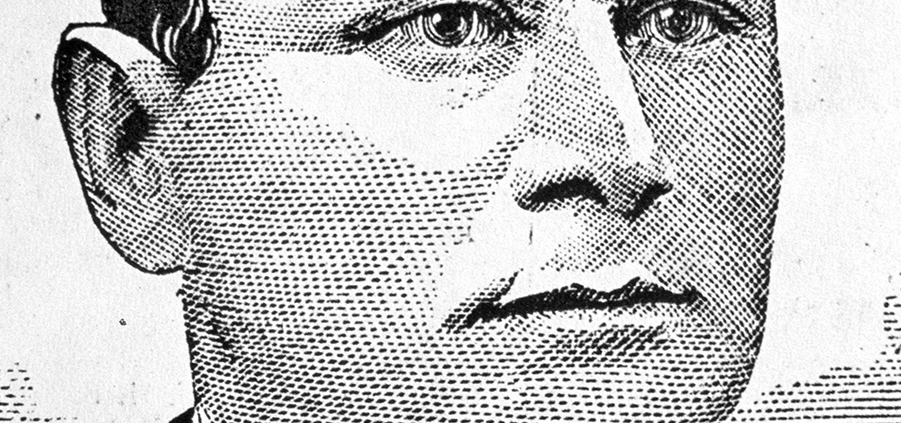September 6, 1869: Joe Start hits four home runs to lead Atlantic Club over Eckfords in championship match
 The unofficial championship of baseball was a constant source of controversy in the pre-professional era. The unsatisfactory and convoluted best-of-three format that decided baseball’s championships was exacerbated by the evasiveness of defending champions. The issue became especially pronounced during the 1869 season, when Harry Wright’s Cincinnati Red Stockings embarked on an undefeated campaign, but because the National Association of Base Ball Players did not recognize the championship and therefore had no authority to force any defense, the Red Stockings were not given the chance to compete for the title. This rendered the championship, in the words of the New York Herald, “empty and dubious.”1
The unofficial championship of baseball was a constant source of controversy in the pre-professional era. The unsatisfactory and convoluted best-of-three format that decided baseball’s championships was exacerbated by the evasiveness of defending champions. The issue became especially pronounced during the 1869 season, when Harry Wright’s Cincinnati Red Stockings embarked on an undefeated campaign, but because the National Association of Base Ball Players did not recognize the championship and therefore had no authority to force any defense, the Red Stockings were not given the chance to compete for the title. This rendered the championship, in the words of the New York Herald, “empty and dubious.”1
Further exacerbating things, it had become en vogue for top clubs to declare games between one another to be exhibitions rather than meaningful contests. “People are willing to pay to see a well played game,” the Herald reported, but crowds naturally became upset “when they are cajoled into paying for the privilege of being present at a game in which neither club has anything to lose … [and which] lacks, therefore, the necessary incentive to work hard.” The attendance for big matches began to dwindle.2
This was not the case on September 6. The Eckford Club of Brooklyn had reclaimed the title from the Mutuals earlier in the summer. The Atlantic Club was Eckford’s first challenger, and both clubs’ directors made it clear beforehand that this match was the beginning of a championship series.3
For the Atlantic Club, George Zettlein was their pitcher and Bob Ferguson his catcher. An 1868 profile in the Brooklyn Eagle called Zettlein “as regular as a pitcher can be and exceedingly swift … and [he] exhibits as much speed in the ninth as in the first innings.”4 The Eckfords’ battery was Alphonse “Phonney” Martin at pitcher and Nat Jewett at the backstop. Martin was known as the “professor of the new school of slow pitching,”5 as opposed to the swift pitching that was growing popular. Jewett had caught for Martin from 1865 through 1867, first with the Empire Club and then with the Mutual Club. The 1869 season was the first they were reunited with the Eckford Club.
Joe Start, the Atlantic Club’s 26-year-old star first baseman, had a history of hitting Martin well. The two men had faced off in eight games, starting in 1865. Start had a career total of 32 runs scored against 19 outs made against Martin; an average of 4.0 runs scored per game against 2.375 outs made. To put those numbers in perspective: According to historian Marshall Wright, a player who scored two runs and made three outs per game was considered average by the standards of the time.6 Start’s performance against Martin was 2½ times better than average.
Against the Eckfords on September 6, Start hit four home runs and made 23 total bases. Single-game efforts like this weren’t unheard of in the pre-professional era: W.H. Murtha hit five home runs in an 1861 contest against the Brooklyn Club, and Lipman Pike hit five in a game against the Danville Alerts in 1866.7 Pike’s and Murtha’s opponents, however, were amateur “country club” teams of no renown, so their achievements are tempered by the anemic quality of their opponents. Start’s big game happened against the defending pennant-holders, his highest available level of competition, making it a parallel to subsequent prodigious big-league slugging performances.
The game commenced at 3:05 P.M. with the Atlantic Club batting first.8 Start was third in the lineup. Martin induced groundouts from the first two hitters, Dickey Pearce and Charlie Smith. With the bases empty and two out, the left-handed Start connected with Martin’s offering and pulled it deep to right field, far beyond the fielder’s reach, for a clean home run. Start’s hit was so powerful that he “trotted” home, according to the New York Clipper, despite the ball staying in play within the cavernous Capitoline Grounds.9
In the top of the second, Start took his second at-bat with two outs, a runner on first and a 4-2 Atlantics lead. Start’s second clout flew over right fielder Ed Pinkham’s head again and carried all the way to the clubhouse in the far-right corner of the grounds.10 Start made it around the bases again for his second home run. The challengers had a 6-2 advantage.
Start was not the only Atlantic to make a four-bagger early on: Dan McDonald hit one earlier in the second inning, and Pike struck a ball to the right-field clubhouse for a home run in the third inning. The ball was “very lively,” according to the New York Sun, which was in character with the Atlantics’ preference.11 Eckford’s second baseman, Jimmy Wood, learned this the hard way when Start came up for his third at-bat. He smoked a line drive toward Wood, who bravely put his hands in front of it. Wood’s efforts were in vain – not only did Start get a double, but Wood’s thumb was injured on the play.12 The Atlantics scored seven in the inning to push ahead, 13-2.
The Eckfords scored four runs in their half thanks to errors from Smith, Pike, and Pearce. Martin and company held the Atlantics to one run in the fourth inning. The score line was now 14-6 and the Eckford bats sprang to life. A combination of sharp hitting by the champs and sloppy fielding by the Atlantics led to 12 runs. The champions were now ahead 18-14 after four innings.
Start led off the top of the fifth inning with yet another massive hit to right field. Accounts differ on whether he scored on his own hit. The Clipper wrote that Start scored when Jewett muffed a throw to home plate. Other accounts say that Start held up at third and scored on Jack Chapman’s home run the next at-bat.13 The important thing to note is that, even in the Clipper’s account, Start was not credited with a home run on the play.
The Atlantics batted around in the fifth, and Start came up for a second time in the inning. He hit toward Wood again, who this time was able to corral the ball and force out Charlie Smith running to second base. The rules of 1869 called for the first batter of an inning to be the player slotted after the person who made the final out in the previous inning. This applied to runners who were put out on the basepaths.14 Because of this quirk, the third out of the fifth was not charged to Start but instead to Smith, meaning that Start batted again to lead off the sixth inning. To the Eckfords’ relief, Martin induced a popout for Start’s first official out. Unfortunately for the champions, the next eight batters all reached base, only one being a base on error.
Start came to bat with still only his one out on the board for the sixth inning. Again, he smashed the ball to right field for his third home run.15 The Eckfords managed to make the final two outs before another run was allowed. The champions scored only one in their half, putting the score at 28-22 in favor of the Atlantics after six innings.
Martin was clearly struggling to get outs, but the Eckfords left him in to pitch the seventh.16 The Atlantics took advantage to blow the game open: all nine men reached base safely before the first out was made. Start contributed a double, his second of the day. The Atlantics scored nine runs and then shut out the Eckfords for a 37-22 lead. The game had become a blowout.
The Eckfords must have considered it a miracle when the Atlantics went one-two-three in the eighth. Dickey Pearce flied out before Charley Smith and Start both fouled out.17 The Eckford Club did not take advantage. They posted their own zero, and the ninth inning began with the same 15-run deficit.
Because he made the final out in the eighth, Start was ninth in the order to start the last inning. His teammates did not let up on the champions, however. Chapman opened with his second home run of the game.18 Out of the next seven batters, only Zettlein was put out. Start came up to bat for the final time and hit another howitzer to right field that rolled to the dugout – his fourth homer of the game.19
All told, Joe Start went 7-for-10 with four home runs, two doubles, and a triple for 23 total bases in the Atlantic club’s 45-25 victory.20 To put his output in context, Shawn Green holds the major-league single-game record for total bases with 19. The Eckford Club recovered to win the second match, 23-9, on October 9, but the Atlantics won the rubber match on November 8 by a score of 16-12 to claim the championship, which they held through the end of 1869.
- Read more: Click here for SABR’s comprehensive list of all 4-HR games in professional baseball history
Acknowledgments
This article was fact-checked by Carl Riechers and copy-edited by Len Levin.
Photo credit: Joe Start, SABR-Rucker Archive.
Sources
In addition to the sources cited in the Notes, the author consulted Baseball-Reference.com and Retrosheet.org for pertinent information. Special thanks to Jacob Pomrenke for his first-draft notes.
Notes
1 “Atlantic vs. Eckford for the Championship,” New York Herald, September 7, 1869: 3.
2 New York Herald.
3 New York Herald.
4 “Atlantic vs. Mutual. – Statistics Concerning the Nines Which Are to Play on Monday Next,” Brooklyn Eagle, August 15, 1868: 2.
5 “Personals and Sundries, “Brooklyn Eagle, June 22, 1868: 2.
6 Marshall D. Wright, The National Association of Base Ball Players, 1857-1870 (Jefferson, North Carolina: McFarland and Company, 2000), xvi-xvii.
7 Start was Murtha’s teammate for the 1861 game. He also hit a home run that day. “Enterprise vs. Brooklyn,” Brooklyn Eagle, September 23, 1861: 3.
8 “First Game for the Championship Between the Atlantics and Eckfords – The Atlantics Victorious – A Grand Batting Game – ‘Old Rocks’ Goes In for Four Home Runs,” Brooklyn Eagle, September 7, 1869: 2.
9 “The Championship,” New York Clipper, September 11, 1869: 178.
10 New York Clipper.
11 “Atlantic vs. Eckford – The Champions Badly Beaten,” New York Sun, September 7, 1869: 2.
12 New York Clipper.
13 “Eckford vs. Atlantic – Defeat of the Eckfords – Score, 45 to 25,”New York Tribune, September 7, 1869: 5.
14 For more on this rule, read “An Odd Playing and Scoring Rule” by John Thorn, Bob Tholkes, and John Zinn in the SABR Origins Committee’s February 2025 newsletter.
15 New York Clipper.
16 New York Clipper.
17 New York Clipper.
18 New York Clipper.
19 New York Clipper.
20 Modern box-score figures were extrapolated from the Clipper’s play-by-play account from September 11. As it happened, Start fell a single short of hitting for the cycle.
Additional Stats
Atlantic Club of Brooklyn 45
Eckford Club of Brooklyn 25
Capitoline Grounds
Brooklyn, NY
Corrections? Additions?
If you can help us improve this game story, contact us.


